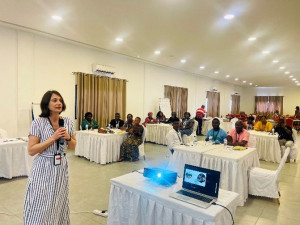By Foday Moriba Conteh
Solidaridad, with support from the Food and Agriculture Organization (FAO), on Monday, April 15th, 2024, commenced a four-day training of trainers’ program aimed at empowering rural women in Sierra Leone to engage in Responsible Agricultural Investment (RAI). Held at the Sierra Palm Hotel on Aberdeen Beach in Freetown, the training titled: “Empowering Rural Women to Engage in Responsible Agricultural Investments (RAI) in Sierra Leone,” marks the third session and brought together participants from four districts: Falaba, Kailahun, Karene and Tonkolili.
The Country Representative of Solidaridad, Andrew Kojo Morrison, described the training session as very important towards the empowerment of rural women to engage in Responsible Agricultural Investments (RAI) in the country.
He said that the overall objective is to strengthen the capacities of future trainers to deliver the RAI training program targeting rural women in four districts, adding that after the training they will follow up to ensure that it is replicated in those districts.
Andrew Kojo Morrison congratulated the participants for their selection and expressed confidence in the training methodology further encouraging active participation to become skilled trainers capable of delivering RAI training to grassroots rural women in their respective districts.
Dr. Austine Bitek, the International Epidemiologist and Officer-in-Charge of FAOR, highlighted the disparity in opportunities between men and women in Sierra Leone’s agrifood systems. Despite women comprising nearly 80 percent of the sector’s workforce, they encounter obstacles in accessing land, resources, finance, training and leadership roles.
He acknowledged the Government of Sierra Leone’s efforts in advancing women’s rights through legislation of which he added that FAO and its partners are collaborating to promote responsible agricultural investments that foster gender equality and women’s empowerment in the country.
Dr. Austine Bitek said that RAI aims to benefit all stakeholders and contribute to sustainable livelihoods, including smallholder farmers, women, and youth and it encompasses various goals such as enhancing food security, eradicating poverty, promoting gender equality, and sustainable development.
He maintained that since 2020, FAO has been actively involved in promoting responsible agricultural investments in Sierra Leone, through partnerships with key organizations adding that FAO has developed concrete actions to make investments in the country more gender-responsive.
Dr. Austine Bitek maintained that to contribute to the implementation of some priority actions of the roadmap, in particular “Strengthening the Capacity of Rural Women to Engage in RAI and in Decision-Making Processes Related to RAI,” FAO and Solidaridad have designed a specific training program to strengthen rural women’s capacity to participate in decision-making processes related to responsible agricultural investments. The program aims to equip women with the skills and knowledge necessary to voice their concerns and proposals effectively.
He said following successful implementations in nine districts between 2022 and 2023, with more than 280 rural women trained, FAO and Solidaridad plan to expand the training program to reach more rural women in the four additional districts.
“Today and in the days to come, FAO and Solidaridad will equip you with the specific knowledge, skills and innovative training methodology. At the end of the training, you will then be able to deliver the training to the grassroots rural women in your respective districts,” he noted.
Maud Oustry, Capacity Development Expert from FAO/Rome said the training program builds upon previous initiatives, including a participatory multi-stakeholder process in 2020 that outlined a roadmap for enhancing gender-responsive investments in Sierra Leone. In 2022, a specific training tailored to the needs of rural women was designed.
She noted that the overarching goals of the training include strengthening rural women’s capacity to advocate and participate in decision-making processes related to agricultural investments, raising awareness among local leaders about the importance of women’s participation, and promoting gender-responsive investments.
Maud Oustry revealed that the training employs a variety of participatory learning approaches, including audio-visual learning, experiential learning, and storytelling techniques, to engage participants effectively.

In her keynote address, the Minister of Gender and Children Affairs, Dr. Mahoi acknowledged Solidaridad’s significant intervention in supporting women farmers across 12 agricultural districts in Sierra Leone.
Notably, the support extended to women cocoa and oil palm farmers in Kenema, Kailahun and Kono districts resulting in successful harvests within three years, adding that the programme’s focus on empowering over 40% of women in Sierra Leone was highlighted as a commendable effort.
Emphasizing the pivotal role of rural women in ensuring food security, Dr. Isata Mahoi highlighted the challenges they face, including gender biases and discriminatory norms, underscoring the importance of addressing these inequalities to unlock the full potential of women in agriculture.
She maintained that the collaboration between FAO and Solidaridad has begun since 2020 in capacitating rural women and organizations across nine districts, furthering that this initiative aims to empower women to actively engage in policy-making related to agricultural investment, aligning with the Customary Land Rights Act of 2022, which grants women full access and ownership of land.
Dr. Mahoi commended that the Government’s recognition of women’s participation and leadership as integral to sustainable economic growth. She highlighted President Dr. Julius Maada Bio’s endorsement of gender-inclusive policies, emphasizing women’s unique contributions to governance and development.
Addressing the workshop participants, Dr. Mahoi urged them to leverage the training to empower rural women in their respective districts. She stressed the importance of disseminating knowledge and promoting gender-sensitive policies, particularly the Customary Land Rights Act, during their future engagements with rural communities.
Responsible investments in agriculture, Dr. Mahoi noted, are crucial for achieving the SDGs, emphasizing the need for gender equality in these efforts.
Dr. Mahoi concluded by highlighting three critical areas of focus: effective training in Good Agricultural Practices, advocacy for women’s land rights and promotion of women’s participation in decision-making processes at the community level.
The Minister expressed gratitude to FAO for funding the training and commended Solidaridad’s Country Representative, Andrew Kojo Morrison, for his dedication to women’s empowerment.
Following the opening ceremony was the official commencement of the four-day training.





